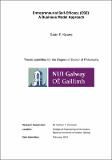| dc.description.abstract | Researchers of entrepreneurship lack a general, yet distinct, conceptual framework that both describes how entrepreneurial action occurs and predicts who does it. Some scholars have noted that the emerging concept of “business model” may help to address this problem, yet little is understood about the transformational mechanisms by which a person moves from her business model to creating a new firm and or a new market. Conceptually, at least, “entrepreneurial self-efficacy” (ESE) is one such mechanism, and a key feature of this activity-specific, theoretical construct is that it can be developed. However, researchers have not, as yet, used ESE to link the business model to entrepreneurial cognition and action.
So, while building on existing studies in the area of entrepreneurial processes, this thesis develops a conceptual framework that describes the distinctive role of the business model in entrepreneurial thought and action. Drawing on ideas from social cognitive theory, hypotheses are generated to test the accuracy of the conceptual framework’s description vis-à-vis ESE. Having selected firms (as opposed to markets) as the empirical object of interest, a process of scale development is used to provide an empirical estimate of ESE (beliefs in one’s capabilities to perform a set of business model activities involved in firm creation). A classification scheme of business model activities is developed so as to guide the construction of 54 Likert-type items, which are the variables used to define ESE. A survey containing these and other items (e.g. questions pertaining to Age) was conducted to collect data, and usable responses were returned by 111 entrepreneurs and 92 non-entrepreneurs.
The results of rigorous methods of statistical inference suggest that “Total Efficacy” (which is a sum of 54 Likert-type items) is a variable that may lead to a person being an entrepreneur, and that distinguishes entrepreneurs from non-entrepreneurs. These findings are important for a number of reasons. In particular, they provide initial support for the conceptual framework’s description and predictions vis-à-vis ESE (as defined in the 54 underlying variables). In this way, the conceptual framework lays the foundation for future researchers who may wish to study how entrepreneurial action occurs and who does it. The new ESE scale, which is based in theory and appears psychometrically sound, may be of interest to people who intend to create a firm. Also, because capability beliefs can be developed, the new ESE scale may be of interest to other stakeholders of entrepreneurship, such as educators and policymakers, who wish to unlock entrepreneurial capabilities through learning efforts. | en_IE |


